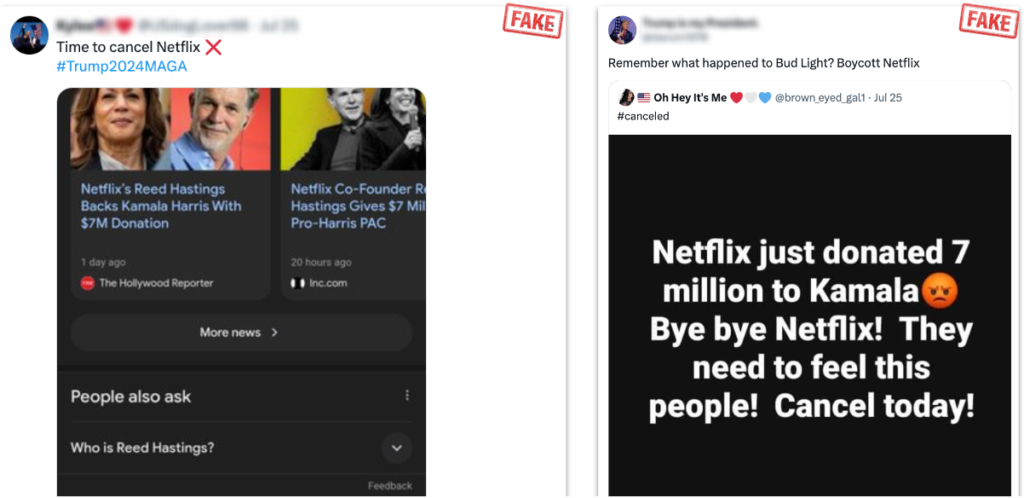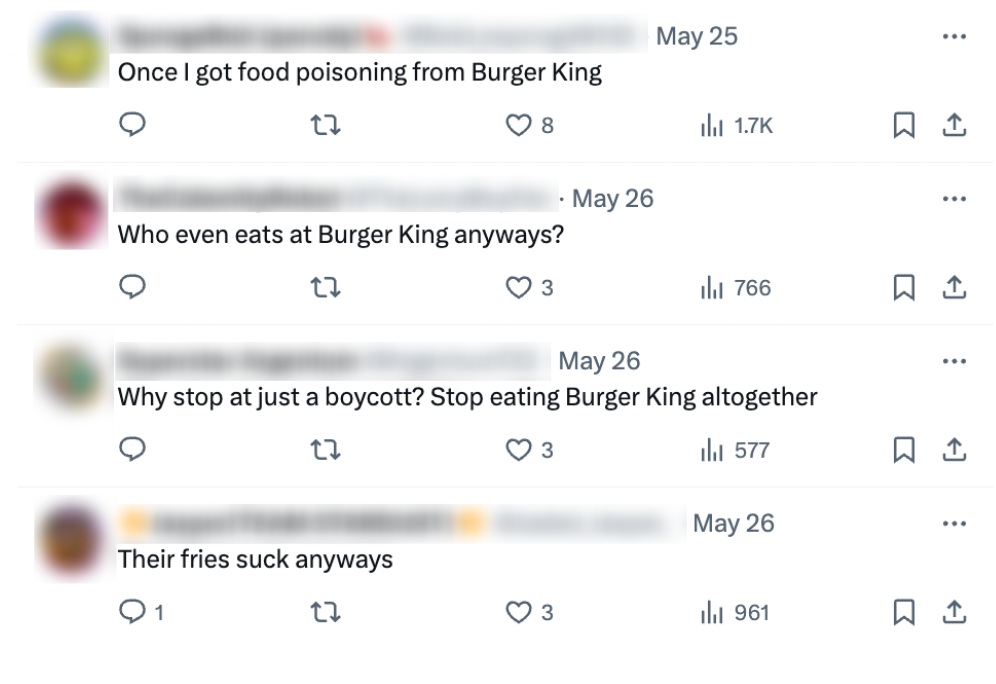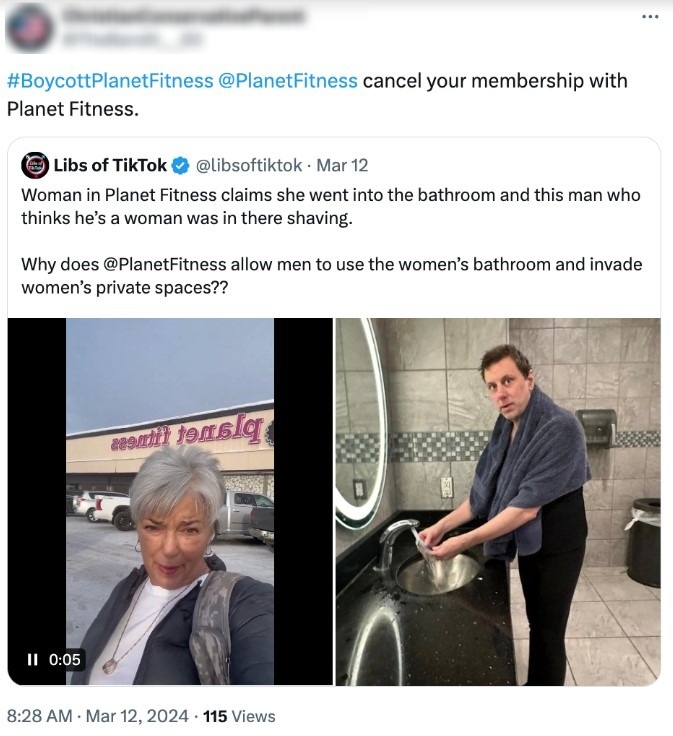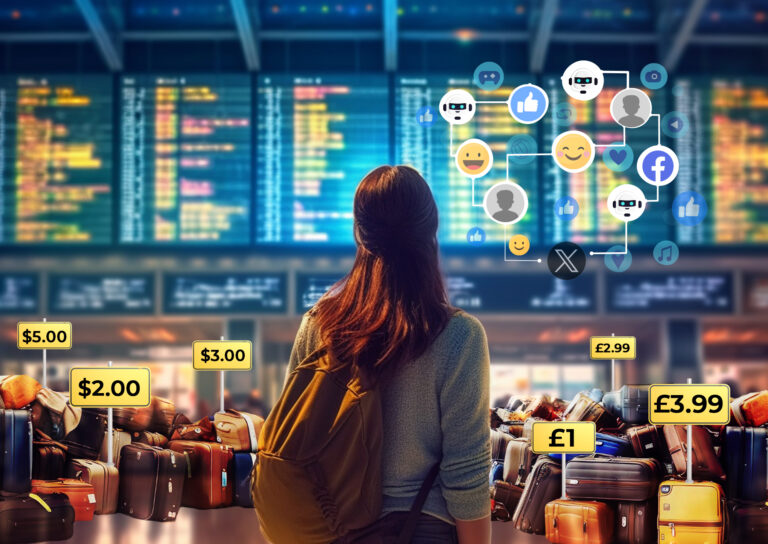Cyabra has been closely monitoring how disinformation and fake profiles polarized and shaped the narrative in 2024. Here’s a roundup of some of the most significant disinformation-fueled attacks and boycotts of the year – and what we can learn from them. Make sure to also check out part 1 of this 2024 brand crisis round-up!
July: Netflix Swept Into Election Disinformation
Elections Bots Already Active in Social Discourse Latched Onto the Trend
Netflix’s co-founder and former CEO donated $7 million to Harris’s presidential campaign, sparking a surge of posts calling to boycott and cancel Netflix – which unlike classic “cancel” calls, actually resulted in a dramatic spike in subscription cancellation for Netflix. 24% of the profiles that targeted Netflix on X were fake profiles that had already been active for a while, spreading election-related messages. Those fake profiles increased the boycott movement while pushing anti-Harris content, achieving a record-breaking 19.5 million views for their content alone, and helping to push #CancelNetflix to 309 million views in just one week.
Read more about Netflix’s crisis

May: Fake Influencers Drove Burger King Backlash
A Few Complaints Escalated Into a Huge Negative Trend
Complaints about prices, taste, and overall discontentment that started at the end of May derailed quickly, amplified by fake profiles on X. Within one single day, negative content spiked, increasing by 192% compared to previous weeks. Fake profiles discussing the brand comprised over 39% of the profiles in the conversation, and their posts and replies reached over 44 million views across May and June. One fake account on X was crucial in amplifying the crisis, spreading the calls for a boycott when the negativity was just beginning to trend.
Read more about Burger King’s crisis

April: “Steal From Loblaws Day” Hits Huge Chain
Fake Profiles Utilized #Greedflation to Attack Loblaws Supermarkets
Protest against Canadian supermarket giant Loblaws started as legitimate consumer-led resentment, following concerns about the cost of living and accusations of “greedflation”, but was picked up by fake profiles, that amplified and promoted the angry voices and used #BoycottLoblaws and #CancelLoblaws to cause a huge crisis, which resulted in real-world damages. When the viral complaints radicalized and turned into “Steal From Loblaws Day” posters, hung on the streets of major Canadian cities, fake profiles continued to spread the posters, resulting in more viral photos of empty Loblaws parking lots.
Read more about Loblaws’ crisis
March: Fake Profiles Pump Planet Fitness Boycott
#BoycottPlanetFitness Reached a Potential 200 Million Views
Planet Fitness faced mounting scrutiny and a major stock drop after canceling a woman’s membership for taking a picture of a transgender woman in the locker room. The very first use of the hashtag #BoycottPlanetFitness, on March 15, came from a fake profile. Other fake accounts shared and reposted controversial authentic influencers with millions of followers, who supported and promoted the boycott calls. Planet Fitness’ stock plummeted after the crisis and took over a month to recover.
Read more about Planet Fitness’ crisis

January: Rip Curl Pulled Into the Vortex of Indian Election
#BoycottRipCurl Was Massively Exploited by Indian Election Bots
International surf sportswear brand Rip Curl went under after featuring a transgender surfer in its latest fashion campaign. At the end of January, #BoycottRipCurl, #RipRipCurl and #SaveWomensSports reached over 220 million views across social media platforms, assisted by the contribution of fake posts, which accounted for 19% of the profiles in the discourse, and 30% of all content. But the worst was yet to come: after Rip Curl removed the campaign and the crisis started dying out, it was resurfaced by Indian election bots who picked up on the trend and used the hashtags as part of a coordinated fake campaign, bringing the damaging hashtag to an increase of 424% in one week.
Read more about Rip Curl’s crisis

2025 Will be the Year of Brand Disinformation
The lessons from 2024 are clear: traditional brand, crisis, and social media strategies are no longer enough. Major companies must learn to identify fake profiles, detect their impact, and deal with their manipulations. They must also take proactive measures to defend against the next issue or crisis, building resilience and staying ahead of these evolving threats. As the tactics of disinformation evolve, enhancing new, sophisticated AI tools, in 2025 brands must also arm their teams with equally advanced defenses to protect against reputational and financial risks. Contact Cyabra to learn more.


